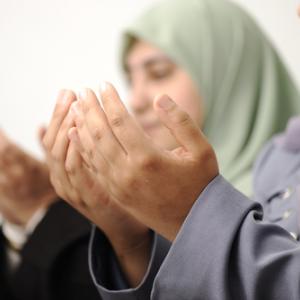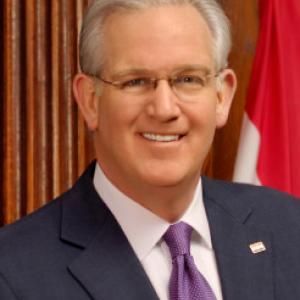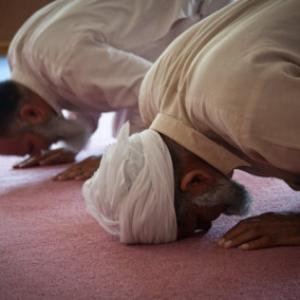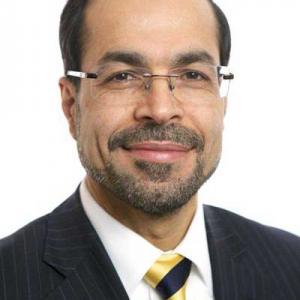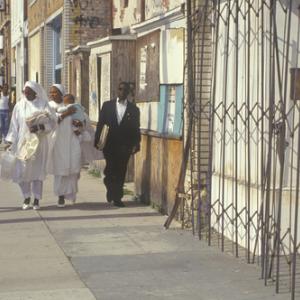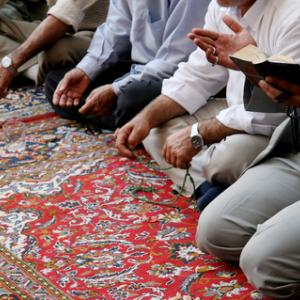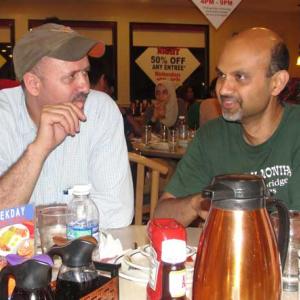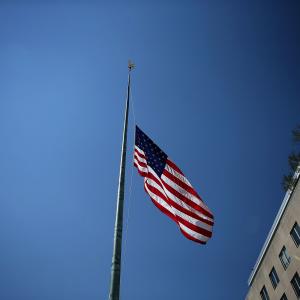Omar Sacirbey writes for Religion News Service in Washington, D.C.
Posts By This Author
Shariah 101: What Is It and Why Do States Want to Ban It?
North Carolina lawmakers on Wednesday approved a bill to prohibit judges from considering “foreign laws” in their decisions, but nearly everyone agrees that “foreign laws” really means Shariah, or Islamic law.
North Carolina now joins six other states — Oklahoma, Arizona, Kansas, Louisiana, South Dakota, and Tennessee — to pass a “foreign laws” bill. A similar bill passed in Missouri, but Gov. Jay Nixon vetoed it, citing threats to international adoptions.
The bills all cite “foreign laws” because two federal courts have ruled that singling out Shariah — as Oklahoma voters originally did in 2010 — is unconstitutional.
Lawmakers Ask Obama for Religious Diversity Summit
Nearly 40 members of the U.S. House, among them Buddhists, Hindus, Jews, and Muslims, sent a letter to President Obama on Wednesday urging him to convene a “Religious Diversity Summit” and do more to fight discrimination against religious minorities.
“The targeting of religious minorities in America is reaching a crisis point and we believe your leadership is crucial to stemming this rising tide of violence,” the letter writers said.
The letter comes just ahead of the first anniversary of the Aug. 5 attack by a white supremacist on a Sikh temple in Oak Creek, Wis., that killed six worshippers. Muslim advocacy groups say there has been an increase in attacks against mosques and Muslims since the Boston Marathon bombings on April 15.
For Some Converts, Ramadan is the Loneliest Time of Year
Since converting to Islam more than five years ago, Paul K. DeMelto of Cleveland has done all he could to become a more knowledgeable Muslim, attending a new converts class and hiring Arabic tutors to help him learn to read the Quran.
But despite his efforts, DeMelto found himself alone last Ramadan, the holiest month of the Muslim year, when adherents fast from sunrise to sunset and eat a communal meal at night.
As he looks to another Ramadan beginning today, DeMelto wonders if this might be the year when he finally lands an invitation to a fellow Muslim’s home for the iftar, the fast-breaking meal.
Citing Risk to Adoptions, Missouri Gov. Vetoes Anti-Shariah Bill
Missouri Gov. Jay Nixon has vetoed a bill that would have made his state the seventh in the nation to prohibit judges from considering Shariah, or Islamic law, and other “foreign laws” in their decisions.
But rather than citing the usual arguments about anti-Muslim discrimination and the freedom of religion, Nixon introduced a new argument against such legislation, asserting it would make it harder for Missouri families to adopt children from overseas.
Nixon said if state judges would not be able to consider foreign decrees that are sometimes required to finalize adoptions, adoptive families and children would be left stranded.
Oklahoma Muslims Aid in Tornado Relief in Bid to Build Bridges
Oklahoma is probably one of the tougher places to be a Muslim in America, but Muslims have stepped in to help with the cleanup of a massive tornado that killed 24 people.
“As Oklahomans, we’re part of this community, and our hearts just break for what happened,” said Adam Soltani, executive director of the Oklahoma chapter of the Council on American-Islamic Relations, one of several Muslim groups collecting donations.
“We want to show the compassion and mercy that Islam teaches us.”
Anti-Shariah Movement Changes Tactics, Gains Success
When Oklahoma voters overwhelmingly approved a 2010 ballot measure that prohibits state courts from considering Islamic law, or Shariah, the Council of American-Islamic Relations filed a lawsuit within two days challenging the constitutionality of the measure, and won.
But when Oklahoma Gov. Mary Fallin signed a similar measure, one that its sponsor said would forbid Shariah, on April 19 of this year, no legal challenges were mounted.
Why the change?
The biggest difference is that the older bill — and others like it — singled out Islam and Shariah, but also raised concerns that they could affect Catholic canon law or Jewish law. Many early anti-Shariah bills also made references to international or foreign law, which worried businesses that the new bills would undermine contracts and trade with foreign companies.
The new bills, however, are more vague and mention only foreign laws, with no references to Shariah or Islam. They also make specific exceptions for international trade. All of that makes them harder to challenge as a violation of religious freedom.
“These bills don’t have any real-world effect. Their only purpose is to allow people to vilify Islam,” said Corey Saylor, CAIR’s legislative affairs director, of the more recent bills.
Poll: U.S. Muslims More Moderate Than Muslims Worldwide
Muslims in America are much less inclined to support suicide bombing than other Muslims abroad, and are more likely to believe that people of other faiths can attain eternal life in heaven, according to a new report released Tuesday by the Pew Forum on Religion & Public Life.
“The World’s Muslims” report looks at Muslim views across seven categories: Islamic law; religion and politics; morality; women; relations among Muslims; interfaith relations; and religion, science, and pop culture. There is also a special section on U.S. Muslims.
Of the countries surveyed, only a majority of Muslims in America — 56 percent — believe people of other faiths can go to heaven; by contrast, that figure among U.S. Christians is about 64 percent. U.S. Muslims are also less likely than Muslims abroad to believe in evolution, sharing views that are closer to those of U.S. Christians.
On suicide bombing, 81 percent of U.S. Muslims said it was never justified, 7 percent said it was justified to “defend Islam,” and 1 percent said it was “sometimes justified.”
Post-Boston Bombings, Female Converts to Islam Face Growing Scrutiny
When Karen Hunt Ahmed and her Muslim husband divorced four years ago, many friends asked her, “Now you can stop this Islam stuff, right?”
Some friends, she thought.
“Like it was a hobby I took up when I got married and now I’m supposed to drop it,” said Hunt Ahmed, president of the Chicago Islamic Microfinance Project, which she founded with two colleagues in 2009.
Hunt Ahmed, 45, is part of a growing sorority of female American converts to Islam, especially those who are or were married to Muslim men, who must deal with the perception that they converted to Islam because of domineering boyfriends or husbands.
The stereotype was revived in the wake of the Boston Marathon bombings, when news emerged that the wife of bombing suspect Tamerlan Tsarnaev, Katherine Russell, converted to Islam after meeting Tsarnaev in 2009 or 2010 when she was about 21.
Poll Says Muslim Brotherhood Has Soured Americans on Egypt
The Islamic political party known as the Muslim Brotherhood has soured American attitudes towards Egypt, arguably America’s most important Arab ally, since its candidate Mohamed Morsi won presidential elections there in June 2012.
That’s according to a poll released Friday by the Arab American Institute in Washington, D.C.
Morsi’s term has been dogged by charges that he opts for authoritarian measures such as martial law. Muslim-Christian clashes have also shadowed his term; there were clashes on April 5 in the town of Khosus that killed four Coptic Christians and one Muslim, and violence also marred the April 7 funeral for the Copts who were killed in that conflict.
According to the Institute’s poll of 2,300 likely voters, only 36 percent of Americans had favorable views of Egypt, down from 66 percent in 1997. At least some of the decline has been attributed to the Muslim Brotherhood, which won Egypt’s parliamentary elections in January 2012, and to Morsi himself, who won the presidency last June by a 52-48 percent margin.
Muslims Detail Fear from NYPD Spy Probe
Muslim and civil rights organizations say a New York Police Department program to secretly monitor Islamic communities has created so much fear and suspicion among Muslims that many find it impossible to lead normal lives.
A new 56-page report, “Mapping Muslims: NYPD Spying and its Impact on American Muslims,” details how the NYPD’s covert surveillance caused Muslims to refrain from activism and change their appearance so as not to appear too Muslim, and sowed suspicion among community members.
As a result, the Monday report asserts, trust between Muslims and police has broken down. The program, in which NYPD policemen secretly visited mosques, Muslim-owned businesses, and student and civic associations beyond New York’s five boroughs, was established in 2001 but uncovered by The Associated Press in 2011.
A spokesperson for the NYPD did not respond to a request for comment.
‘Virtual’ Public Schools Draw Interest of Religious Families
Worried about exposure to foul language, immodest dress, peer pressure, and other inappropriate behavior, Susan Brown didn’t want her two daughters attending public schools — even though she’s a substitute teacher in a public school in Minnesota.
Brown initially home-schooled her daughters until a friend told her about the Minnesota Virtual Academy, an online public school that is fully accredited. She liked the curriculum, and as a single mom relying on substitute teaching income, she preferred how the school provided the supplies instead of having to buy supplies herself as a home-school parent.
“You can’t give your kids an effective moral and religious upbringing if you only see them a couple of hours a day,” said Brown, a Catholic whose daughters, now in the 10th and 12th grade, started virtual school in the second and fourth grade. “When you’re at home with them, you can incorporate your beliefs into the day.”
Since Florida became the first state to try them in 1996, virtual public schools have enjoyed dramatic growth, with at least some of it coming from religious families. Like home-schooling parents, parents of virtual public school students like having their children home so they can integrate religion and values into the school day.
American Muslims Celebrate Defeat of Congressional Critics
American Muslims are celebrating the ouster of two congressmen known for their anti-Islamic rhetoric, and heralding the outcomes as a sign that Muslim voters, at least in some districts, are a political force to be reckoned with.
"These encouraging results clearly show that mainstream Americans reject anti-Muslim bigotry by candidates for public office and will demonstrate that rejection at the polls," said Nihad Awad, executive director of the Council on American-Islamic Relations. "This election witnessed an increased political awareness and mobilization effort among American Muslims that dealt a major blow to the Islamophobia machine."
Republican Rep. Allen West lost to Democrat Patrick Murphy by about 2,500 votes in Florida’s 18th Congressional District, which includes Fort Lauderdale and West Palm Beach. West has not conceded, however, and has filed a motion to have paper ballots recounted.
There are roughly 160,000 Muslims in Florida, comprising about 0.9 percent of the population.
Over in Illinois, 21,000 votes separated Republican Rep. Joe Walsh from his successful Democratic challenger Tammy Duckworth, an Iraqi War veteran and double amputee. Illinois is home to the country's largest concentration of Muslims, about 360,000 comprising 2.8 percent of the population.
Activists Say Religion Key to Combating Female Genital Mutilation
BOSTON -- The one thing that Afrah Farah will tell you about her genital cutting experience is that it happened. She doesn’t want to say how old she was, where it happened, or who was or wasn't with her.
Yet, despite the painful memories that the experience evokes and her concerns about people's reactions, Farah, said she knows she has to speak out.
“It’s basically a traumatizing experience. It’s traumatizing for every young girl that goes through that. It’s something that sticks in your memory, and physically,” said Farah, a Somali immigrant who came to the Boston area by way of Kuwait and Germany in 2007, and now works as a drug developer in a Massachusetts laboratory.
“There are millions of people who are affiliated with this procedure -- parents, grandparents, people in the community -- and to label them all as bad people or barbaric, that’s wrong. You will push them away. To solve a problem like this, you need to approach people with respect.”
Because of its severity and prevalence, female genital mutilation (FGM, or "cutting") is arguably one of the most important human rights issues in the world. It’s also become increasingly important in the U.S. as the number of immigrants from countries where it is practiced grows.
Muslims Back Obama, But By Smaller Margin Than 2008
Nearly nine in 10 Muslim American voters pulled the lever for the Democratic candidate in the last two presidential elections, partly because of Republican policies and rhetoric that many considered anti-Muslim. In 2008, they also thought President Obama would usher in an era in which Muslims would be more accepted at home, and relations between America and the Islamic world would see improvement.
But this year, Muslim American support for President Obama shows signs of waning, which could be enough to affect the 2012 election in key swing states where a few thousand votes could have a big impact.
Several of those swing states -- most notably Virginia, Michigan, Florida, Pennsylvania, Colorado, and Ohio -- have enough Muslim voters to turn a tight race, experts say.
According to a poll of 500 Muslim American voters released Wednesday (Oct. 24) by the Council of American-Islamic Relations in Washington, 68 percent of Muslims said they would vote for President Obama, while 25 percent were undecided. The poll, which had a margin of error of plus or minus 5 percentage points, also found that 91 percent of Muslims intend to vote.
Shiite Muslims Quietly Establish a Foothold in U.S.
The variation in the proper way to pray is one among several differences that exist between Shiites, who make up about 15 percent of Muslims globally and in America, and the majority of Sunnis. Until recently, those differences mattered little in the United States, where the two groups bonded as Muslim minorities and prayed in the same mosques.
"There weren't enough of either to justify the cost of building sectarian mosques, and because in general, early generation immigrants were less focused on establishing formal houses of worship," said Andrea Stanton, a religious studies professor at the University of Denver.
That is changing, however, as American Shiites are increasingly establishing their own mosques. According to "The American Mosque 2011," a survey sponsored by several Muslim American organizations, 7 percent of roughly 2,100 mosques in America are Shiite, and most have been built in the last 20 years.
One reason: Shiites have become numerous and financially strong enough to manage the expensive process of buying or building their own mosques. Another factor: the growth in Shiite populations as immigrants flee persecution in Iraq, Bahrain, Saudi Arabia, Afghanistan, and Pakistan, where Taliban gunmen recently executed at least 22 Shiite bus passengers.
Shariah or Not, Muslim Divorces Can Get Tricky
New Jersey lawyer Abed Awad has been involved with more than 100 cases that involved some component of Shariah, or Islamic law, and knows firsthand how complicated things can get.
In one of those cases, a woman claimed she was married to a man according to Islamic law in her native west Africa. The man asserted there was no valid marriage, leaving a judge to decide whether the two were ever legally married in the first place.
If the judge rules they were married, there will be a divorce, and she will receive alimony and a share of marital assets. If the judge rules that there is no marriage, then the woman will be left with nothing from her relationship.
To make a ruling, the judge will need to consider what Shariah, as understood in one corner of western Africa, says about what constitutes a legal marriage. He will likely have to consult Islamic law experts and apply what he learns to his decision.
But what if American judges were prohibited from considering Shariah and other foreign laws, as many state and national politicians want to see happen?
Muslim Parents Wrestle with Passing on Islamic Values
Muslim immigrants to America frequently worry whether their children will be able to maintain their Islamic identity in a country with a reputation for rampant vice and promiscuity. Many respond by limiting their children’s social contacts to school, family, and mosque.
But that approach can backfire, some Muslim family experts say. While they advise parents to help their children make Muslim friends, they also say Muslim kids can — and should — fully participate in American culture without compromising their Islamic values.
It’s a formula that’s worked for generations.
Farhat Husain was 23 when she left Pakistan in 1964 for England, where her husband received his Ph.D. at Oxford. Her daughter was born there in 1967, before the family moved to New Haven, Conn., in 1969, then to the Boston area in 1971. Her son was born there in 1976.
Both she and her husband were practicing Muslims and well-educated, and wanted the same for their children. She became involved in the international clubs at the universities where her husband worked — cooking for potlucks, manning information booths and presenting about Islam at churches, community centers, and her children’s schools.
U.S. Muslims, Copts Appeal to Rioters: Stop the Violence
Muslim and Coptic Christian leaders in the U.S. are pledging not to let a spate of violent protests in some 20 Islamic countries derail recent efforts to improve the sometimes troubled relations between the two communities.
On Sept. 18, the Egyptian government ordered the arrest of seven Egyptian-born Copts now living in the United States who were allegedly involved in an anti-Muslim film that portrayed Islam's Prophet Muhammad as a bumbling sexual pervert.
“We cannot allow the actions of a few deceived fanatical individuals to define our communities,” said Bishop Serapion, head of the Los Angeles Diocese of the Coptic Orthodox Church, speaking during a press conference on Sep. 17 with Muslim leaders in Los Angeles.
“We call on members of both religions to lean on our faiths to counter the hate and the violence with good speech and positive work,” added the Egyptian-born bishop.
The show of solidarity comes almost a week after protesters in Egypt, where about 10 percent of the 90 million Egyptians are Coptic, attacked the U.S. embassy, setting off protests in other Muslim countries, including neighboring Libya, where American ambassador Christopher Stevens and three other Americans were killed.
Can Dog Owners Still Be Good Muslims?
Worshippers at Toronto's Salahuddin mosque were bracing for protests Friday as part of "Walk Your Dog in Front of a Mosque Day."
The event is being organized by supporters of a man who claims Muslim protestors kicked his English mastiff, Cupcake, during an anti-Israel rally last month.
While claiming that they wanted to draw attention to Muslim attitudes toward dogs, the organizers' Facebook page is replete with hostilities. One man wrote that he would throw protestors into a "lake of fire" and shoot their dogs, and the event has been promoted on a white supremacist website, StormFront.org.
Some Muslims responded with their own "Good Muslims Love Dogs" Facebook page, including at least one photo of a veiled woman with a veiled dog.
Muslims' alleged canine-phobia is often cited by critics of Islam as an example of how the faith is incompatible with Western values. Some Muslims have perpetuated that narrative, such as when a Somali cab driver in Minneapolis made national headlines in 2007 when he refused to let a blind man bring his seeing-eye dog into his car.
Yet many Muslims all over the world have dogs, and dogs figure prominently is some Islamic countries, such as Turkey, famous for its Kangal and Akbash breeds.
U.S. Muslims Worry About Fall-Out from Libya Attacks
Muslim Americans condemned violence in Egypt and Libya that left four Americans dead, but remain concerned that the deaths could rekindle anti-Muslim sentiment just as post-9/11 resentment was starting to ebb.
U.S. Ambassador to Libya Christopher Stevens and three embassy workers were killed on Tuesday when fundamentalist protestors attacked the U.S. consulate in Benghazi, Libya, in response to a low-budget film that attacks Islam’s Prophet Muhammad, reportedly made by an Israeli real estate developer who lives in California.
Imam Talal Eid, the Islamic chaplain at Brandeis University near Boston and a former member of the U.S. Commission on International Religious Freedom, predicted the violence would lead to “more resentment” against Muslims, who he criticized for not doing enough against terrorism.

